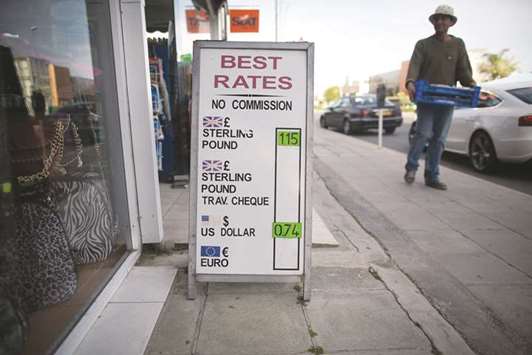Cyprus is lined with adverts for foreign exchange. The low-tax island in the eastern Mediterranean is home to 130 retail forex brokers, the most in Europe.
Yet increasing industry rules in different countries, leading to higher costs, could drive some European companies to seek new offshore bases in Asia. Others see the industry consolidating, benefiting established brokers that can educate clients.
“Some brokers could leave the EU and head to a country such as China, which is not necessarily a good thing,” Mark Chesterman, global business development officer at UK-based IG Group, said at a Bloomberg event in Limassol, Cyprus.
A global regulatory approach to the industry would prevent current ‘location arbitrage’ opportunities where brokers consider changing their country to take advantage of looser rules, Chesterman said. National regulators plan to boost rules governing retail foreign-exchange trading services, a market worth $282bn daily, according to the latest survey by the Basel-based Bank for International Settlements.
Cyprus’s low tax and capital rules — its capital requirements level can range from as little as €125,000 to €750,000 — have lured brokers and market makers. As a European Union member, companies based there can also offer their services throughout the 28-member state bloc. The country’s regulator earlier this year proposed rule changes on offering binary options.
More than 40 global foreign exchange participants, steered by central bankers, have hammered out the FX Global Code — 75 pages of voluntary standards aimed at rooting out misconduct in the $5.1tn-a-day currency market. The guidelines come after a rate-rigging scandal led to about $10bn in fines for banks and damaged trust in the industry.
While most brokers at the Cyprus event welcomed increased regulation as a sign the industry is maturing, it is likely to drive consolidation. Following implementation of the US Dodd-Frank financial reform legislation in 2010 after the global financial crisis, the number of companies offering retail brokerage services in the US fell to three from around 40, owing to higher minimum capital requirements, brokers said.
In the UK, the country’s Financial Conduct Authority in December proposed stricter rules for firms selling retail forex products. It has concerns that more retail customers are beginning to trade products that they don’t necessarily understand. Last year the FCA proposed tougher rules on sales of contract-for-difference products, such as spread bets, leading shares to plummet in UK retail trading companies such as CMC Markets and Plus500.
“Consolidation aside, there will always be opportunities for niche players to come through,” said Marios Hadjiyiannakis, chief executive officer of Nicosia, Cyprus-based Safecap Investments Limited.
An opportunity for less established firms could arise from targeting technology-savvy younger professionals, in an industry where brokers say the typical retail forex investor is a 50-year-old male.
“We need to be niche at something,” said Graeme Watkins, chief executive officer of London-based Valutrades.
“No broker has yet found a way to tap into millenials, as culturally they’re very different, and some companies who have developed mobile applications for other businesses may step in to target them.”
Safecap’s markets.com trading platform started a partnership with English soccer club Arsenal in 2014, while IG Group is already focusing on millennials. “Their share of wealth makes them a niche target for a new entrant into the market,” said IG’s Chesterman.
The path for brokerage services may also be to put investor education at the forefront of the industry’s focus, to better train retail investors that lack sophistication.
“You cannot have inadequate brokers offering sophisticated products,” said Safecap’s Hadjiyiannakis.

A sign advertising foreign exchange rates for euros, sterling and US dollars outside a store in Limassol, Cyprus. The low-tax island in the eastern Mediterranean is home to 130 retail forex brokers, the most in Europe.
